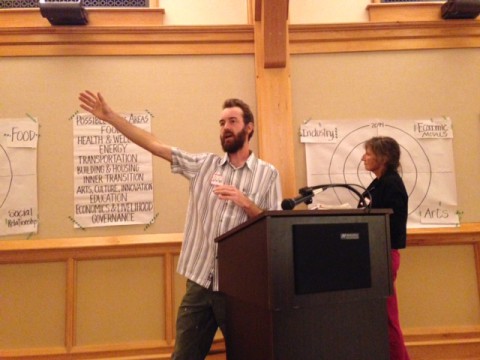Can you imagine Asheville’s sustainable future? Forty years from now, walking down the streets, what do you see? What are you wearing? What are you eating? What do you hear? What do you smell? What might Asheville’s most positive potential feel like? Can you imagine it?
Transition Asheville members asked these questions at their fifth-anniversary potluck and community visioning, held last night, Oct. 13, at St. Mary’s Episcopal Church. We need “to see the positive future that we want to live in and want to manifest. This is a really unique thing that Transition brings to the world, to the environmental and social justice movement, [and that is the] concept of positive visioning,” said Dylan Ryals-Hamilton, Transition trainer and organizer when he addressed the crowd of about 30 people.
Ron Hopkins, the figurehead behind the international Transition movement, dedicates an entire chapter of his book, The Transition Handbook, to the power of positive personal and communal visioning.
“In our culture,” continued Ryals-Hamilton, “we basically get two different stories about the future. The science-fiction films we see about the future are either these Mad Max apocalyptic [realms] where everyone is fighting over the last bit of remaining resources (it’s very violent and bleak, there’s very little green) [or] the other one is this kind of Star Wars/Star Trek techno-fantasty [promoting] the idea that we’re going to leave earth behind to colonize another planet because we’ve trashed this one. I bet a lot of folks in this room don’t think that that’s going to happen.”
Everyone who attended was then asked to close their eyes and imagine Asheville, 40 years from now, and what that might look like in its most positive manifestation. Listen to the vision-meditation here (skip the first minute to dive right in):
Participants then dispersed into breakout groups by category, including social justice (a world without poverty), redefining neighborhoods, energy solutions, infrastructure and building, new economic models, and art. Each group was asked to generate a timeline for change, starting with immediate action and rippling out through four decades, from 2024 to 2034 to 2044.
In the social-justice group, Susan Garrett said that the first and immediate step towards building a world without poverty is to offer a living wage to all workers: “The is no reason that the people I work with should have two jobs in fast food and still be unable to pay their bills.”
Deb Scott said, “We need to change our story, we need to redefine success.”
Transition events like these challenge us as individuals and as a community to imagine a more positive world where resilience is built on a local level. Transition Asheville meets on the second Monday of each month. For more information or to get involved click here.






Did you listen to the vision/meditation? What did you see? What does Asheville 2044 look like to you?
How does this organization interface with other organizations/agencies in town to achieve its goals? Did City Council member participate? Members of the Hub Project? Representatives of the Chamber? UNCA and Warren Wilson faculty members/administrators? More info about the group’s specific projects would help. Their webpage is still vague.
Hi Curious. The Transition Asheville webpage is (still) necessarily vague, because our work is broad in scope and our projects and focus constantly shifting according to the passions and interests of our participating members. While we did reach out to some particular leaders and organizations in our community to invite them to the event, most of the participants were invited through our e-newsletter or found out about the event on our facebook page. That said, we had folks there from the Asheville-Buncombe Food Policy Council, the Bountiful Cities Project, Asheville Beyond Coal, Share Asheville (“promoting and mapping the Sharing Economy”), the Asheville Tool Library (still in its forming stage), Sunergize WNC, West Asheville Garden Stroll, as well as the Green Grannies (a troupe of social/environmental activist-singers), several members of local church “green teams”, a number of local business owners who through various enterprises have been working for the betterment of our community, and just an all around bunch of good folks.
The members of our core group (the TA “Common Table) work with many of the initiatives mentioned above, and others, and on a wide range of projects, from the backyard-scale to input on city and regional policy. Transition as a concept, is all about the context. The context of rising fuel costs, increasingly severe weather, the precarious global economic system, all inform (and are affected by) the work undertaken by any organization working toward a better future. Overcoming denial, and acknowledging that we have nothing to lose and much to gain by seeking a more harmonious way of living and meeting our needs helps us move forward proactively in the face of these issues. The goal of this event was not to decide anything or to put some particular project into action. We wanted to celebrate our 5th year by giving our community an opportunity to feel joyful and hopeful about their work, their volunteerism, and the future that might be in store for their grandchildren. The ideas, personal connections, and next steps generated were simply an excellent perk.
Thank you so much for that detailed reply. Much clearer now!
30 people is hardly a crowd.
Two’s company three’s a crowd.